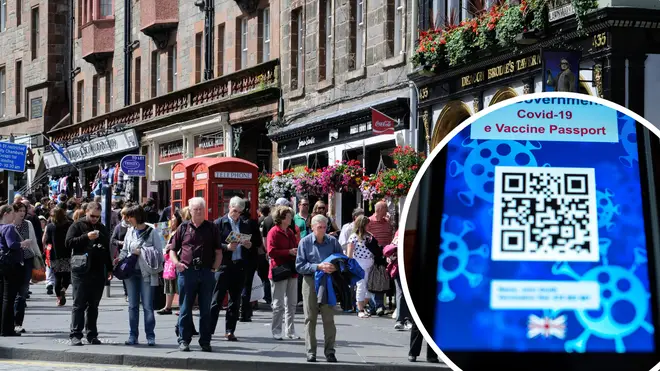
Paul Brand 10am - 12pm
1 October 2021, 00:29 | Updated: 1 October 2021, 00:33

Scotland's vaccine passport scheme comes into force at 5am on Friday October 1, meaning people attending large events and nightclubs will need to show proof of vaccination using a Scottish Government app.
However there is still a grace period in place up until October 18 where businesses will not face punishment for not checking certification.
Unlike many other vaccine passport schemes, there is no option under the Scottish system to show proof of a negative test or recent recovery from Covid-19.
Read more: One in five households face fuel poverty amid 'toxic cocktail of challenges'
Read more: Plain clothes officers will now work in pairs, Sadiq Khan tells LBC
The introduction of vaccine passports has been controversial, with Scottish Tory leader Douglas Ross telling the First Minister that the plans to introduce it should be delayed.
Mr Ross said the plans had been "left to the last minute", citing the fact that as of 12 noon on Thursday the app had still not been released, and the fact that the Covid-19 Recovery Committee had only seen the evidence behind the scheme on Thursday morning.
"The First Minister and I disagree about this policy - my party want it scrapped - but surely she must accept that the scheme is not ready and must be delayed," said Mr Ross at First Minister's Questions.
But the First Minister refused to delay the implementation, citing a judgement from Lord Burns' - who ruled against the Night Time Industries Association Scotland in its attempt to delay the move - saying the scheme was "balanced".
"All along, I've been very candid and clear - none of us want to be in this position, none of us want to be having to take any of the steps we've had to take over 18 months now to seek to contain a virus, keep people safe and try to limit the health and other damage that this virus does," the First Minister said.
"This is a targeted and proportionate way to try to reduce the harm that the virus can do over the winter months while keeping our economy fully open, fully functional and fully trading.
"The judgment from court this morning recognises both those reasons and the way in which the government has gone about this."

FM of Wales: 'I don't think a vaccine passport can do any harm.'
MSPs were told on Thursday that vaccine passports can be a "double-edged sword" - whilst similar schemes around the world have shown they can increase vaccine uptake, they can also stiffen opposition to vaccines among groups which are already mistrustful as they view it as a form of control.
Professor Christopher Dye of Oxford University, Professor Stephen Reicher of St Andrews University and Professor John Drury of Sussex University gave evidence to Holyrood's Covid-19 Recovery Committee, and noted the fact that there was no option under the Scottish scheme to show natural immunity or proof of a negative test.
Prof Dye said he felt vaccine certification was largely a "feasible and helpful process", adding that he generally agreed with the Scottish Government's evidence paper on it.
But he added he was 'surprised' to find that Scotland's vaccine passport would only show proof of vaccination, and not proof of a negative test or having recently recovered from the virus.
Read more: 'What are you doing other than being sad?' Jess Phillips hits out at Patel and Cressida
Read more: Man accused of 'predatory' murder of Sabina Nessa used 'extreme violence,' court hears
"Namely, a negative test of some kind or previous evidence of an episode of Covid, implying that one is the subject would be immune in some regard," he said.
"The advantage of a tripartite system like that is that it provides a back-up for those who really don't want to be vaccinated or cannot be vaccinated for medical reasons."
He said this could lead to issues with travel around Europe.

Boris Johnson says vaccine passports can't be ruled out in winter
Prof Reicher said vaccine certification schemes can be "a double-edged sword".
In communities where there is high trust of vaccines, he said it could encourage indifferent people to be jabbed.
However those who are already hesitant could become more so if they feel the vaccine is becoming compulsory.
Prof Reicher said: "We have data to show this, that in high-trust individuals and communities you find that the prospect of vaccine passports increases the intention to get vaccinated.
"Whereas for those who have low trust in communities such as the black community - where you have low trust - it can actually, not only have no effect, it can actually increase opposition."
He also noted that there is some evidence showing people engage in more risky behaviour if they are vaccinated, saying that public health messaging alongside other measures was "absolutely critical".
Read more: Fuel crisis: London and South East hit hardest as drivers 'fill up with £1.72 of petrol'
Read more: Eco protesters blockade M25 yet again, defying threats of jail time
Prof Drury also described what he called the "backfire effect", where anti-vaccine views stiffen.
He said: "Some groups harden, instead of becoming motivated to get vaccinated they harden in their anti-vaccine view because they construe and understand the scheme as a form of control.
"And it tends to be the same groups, or people in the same groups, that are not getting vaccinated."
In England, plans for vaccine passports in nightclubs and other large venues were shelved mere weeks after ministers insisted they were going ahead.
However vaccine passports could form part of the Government's "Plan B" in the Covid winter plan, which will be enacted if there is "concerning data" - for example, soaring hospitalisations.